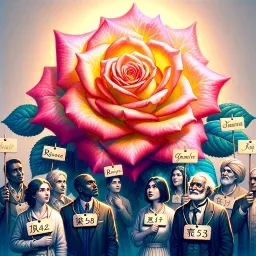”All the world'
s a stage, and all the men and women merely players“

0
0
0
0
- Meaning
- The phrase "All the world's a stage, and all the men and women merely players" uses the metaphor of a theatrical stage to describe how human beings live their lives. It suggests that life is like a play, where everyone has specific roles, entrances, and exits (i.e., birth and death), and performs according to a script (i.e., societal expectations and life circumstances). The phrase highlights the transient nature of human existence and our varied roles across different stages of our lives.
- Allegory
- The expansive stage represents the world, and the diverse characters symbolize all the men and women who participate in life’s drama. The different activities—play, work, reflection—show the various roles people assume through different life stages. The changing backdrop from dawn to dusk signifies the passage of time and the ephemeral nature of our existence. Warm lighting conveys the richness and value of life’s experiences, while the spotlight focuses on the central roles, emphasizing that every individual’s part, no matter how big or small, is essential to the overarching narrative of life.
- Applicability
- This phrase can be applied to personal life by recognizing that we each play multiple roles during our lives—such as child, student, professional, partner, and parent. Understanding this can encourage us to appreciate and adapt to different stages and circumstances, to approach life with a sense of flexibility and performance, knowing that change is a constant, much like actors moving between different scenes and characters.
- Impact
- This phrase has had a profound impact on literature, theatre, and popular culture. It is frequently cited in discussions about the nature of human life and roles, and has inspired various artistic works, performances, and philosophical reflections. The metaphor of life as a stage has been used to explore themes of identity, fate, and the human experience in multiple contexts.
- Historical Context
- William Shakespeare wrote "As You Like It" around the year 1599. The Elizabethan era, during which Shakespeare lived and worked, was a time of great cultural flourishing in England, marked by the rise of theatre and literature. The idea of life as a performance reflects the period's interest in exploring human nature and social roles.
- Criticisms
- While the phrase is widely celebrated, some critics argue that it simplifies the complexity of human life. The idea of predetermined roles might be seen as limiting human individuality and agency. Additionally, interpreting life purely as performance could be criticized for overlooking deeper emotional and psychological aspects.
- Variations
- There are various interpretations across cultures that see life in metaphorical terms similar to a stage. For example, the Bhagavad Gita from Indian culture talks about life as a series of duties and roles (dharma) that individuals must perform. While each culture brings its own nuance, the core idea of life's transience and role-playing is a common theme.
-

The golden age is before us, not behind us.
-

Some rise by sin, and some by virtue fall.
-

Cowards die many times before their deaths; the valiant never taste of death but once.
-

When sorrows come, they come not single spies, but in battalions.
-

A horse! a horse! my kingdom for a horse!
-

What is past is prologue.
-

If music be the food of love, play on.
-

know what were good to do, chapels had been churches, and poor men's cottages princes' palaces.
-

What's in a name? That which we call a rose by any other name would smell as sweet.
-

No legacy is so rich as honesty.
-

Now is the winter of our discontent.
-

I must be cruel, only to be kind.
No Comments